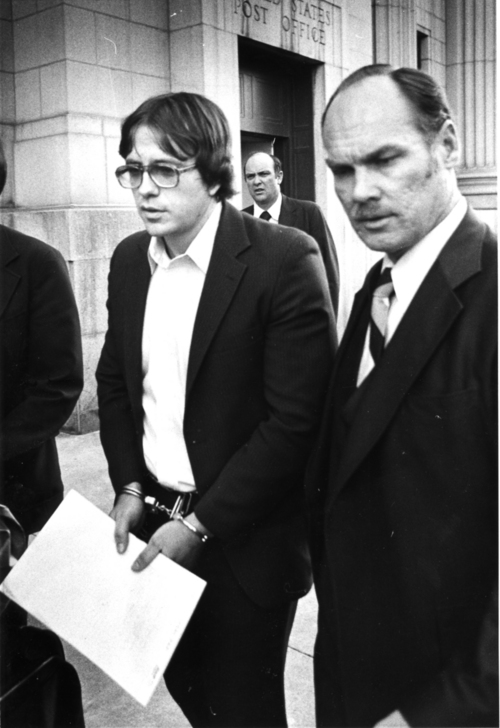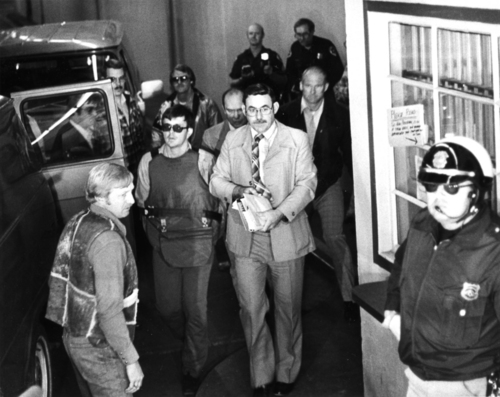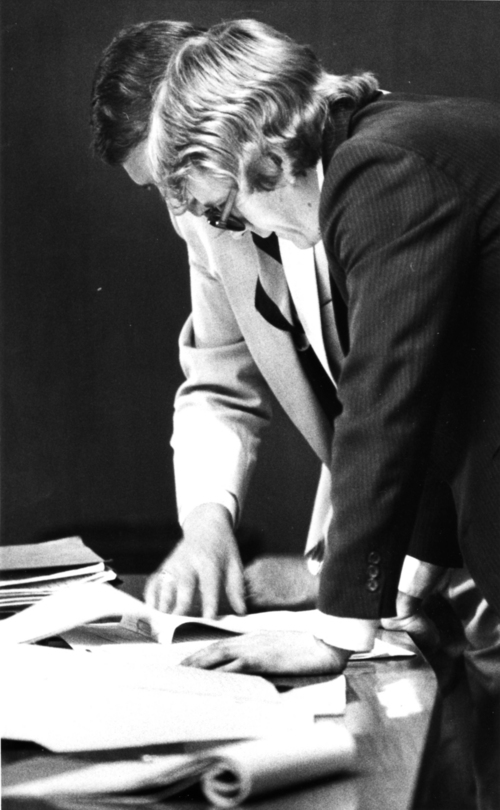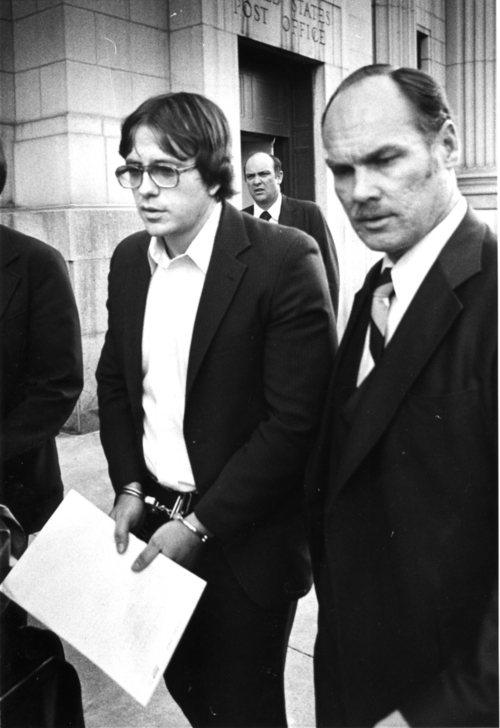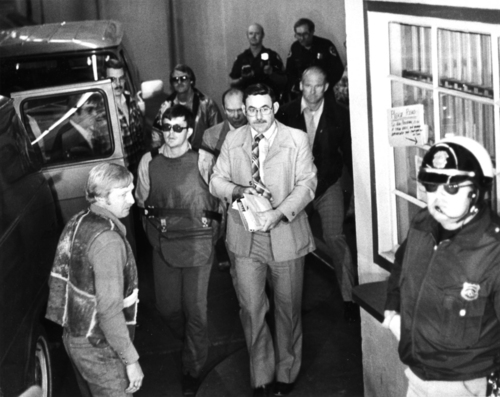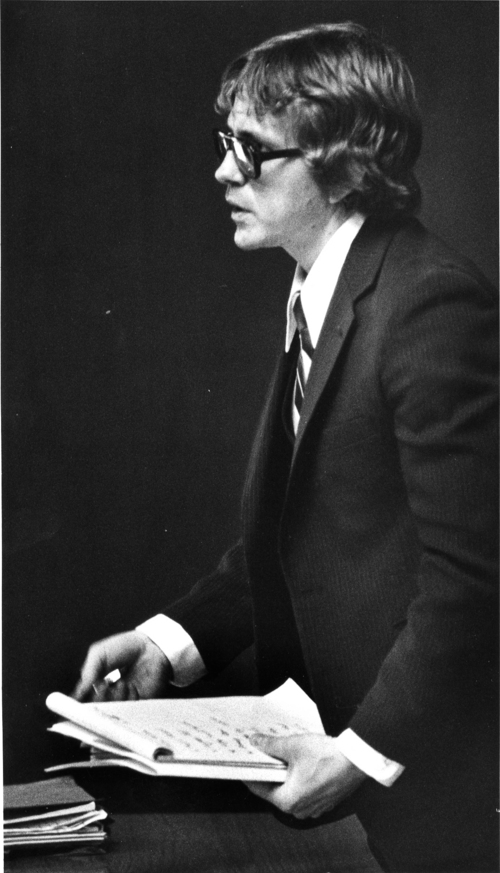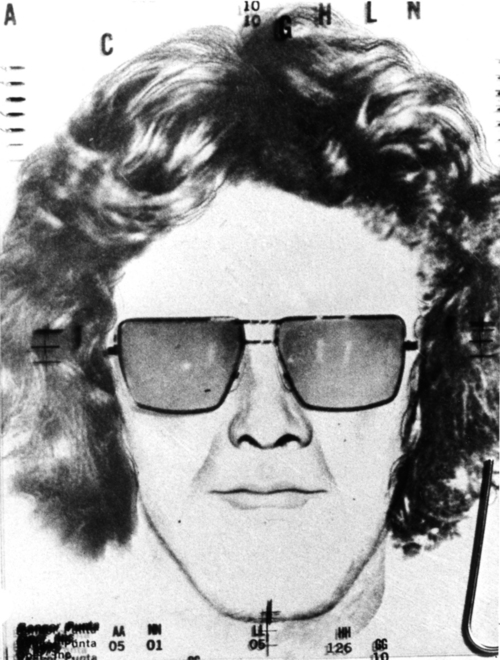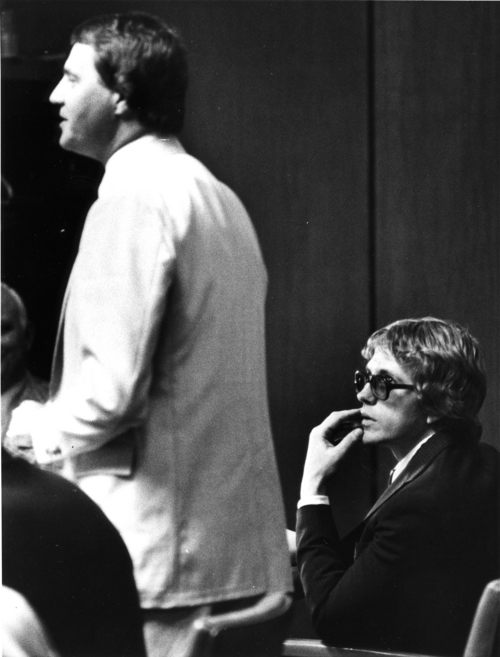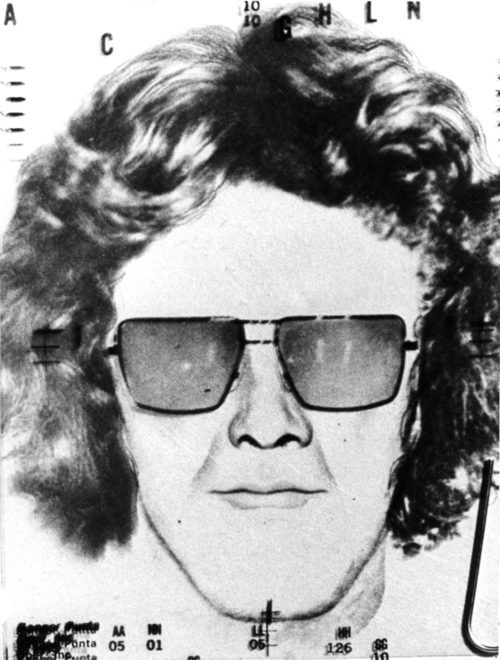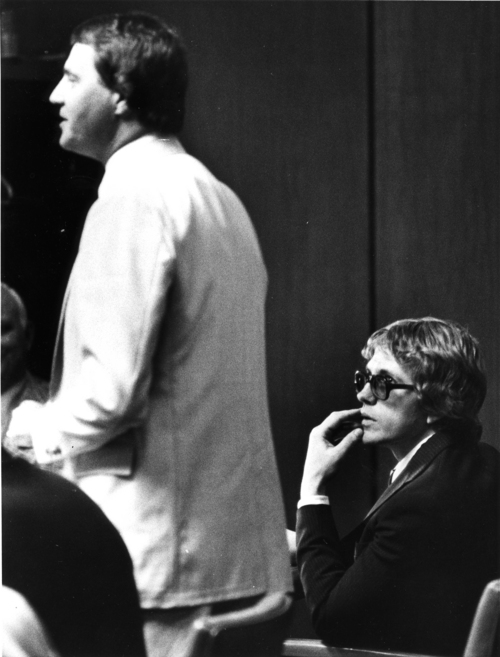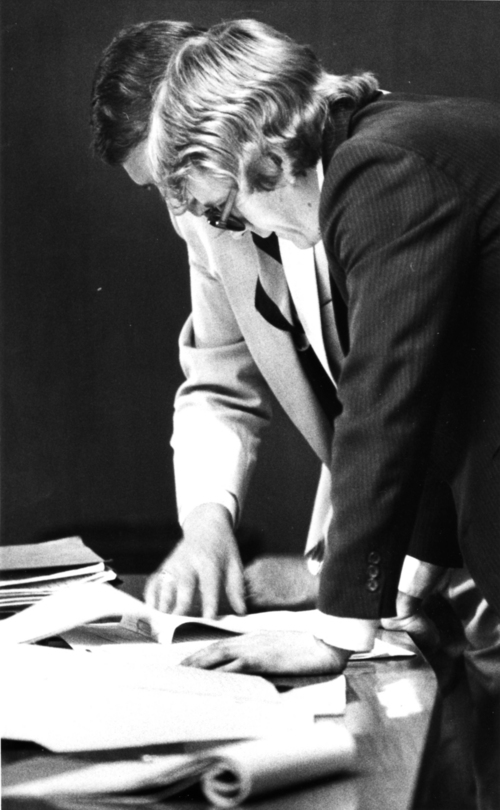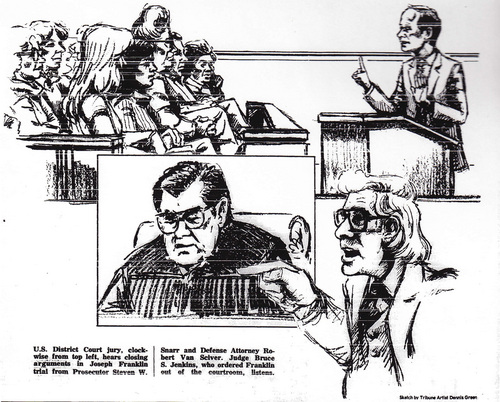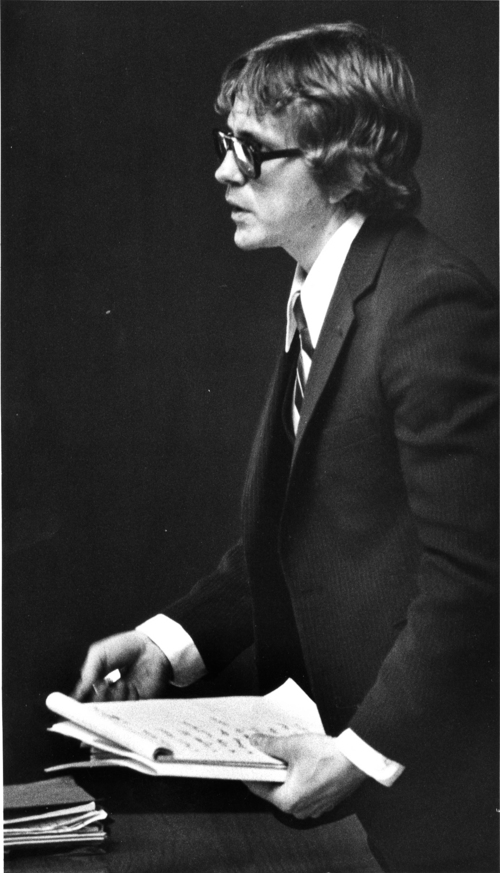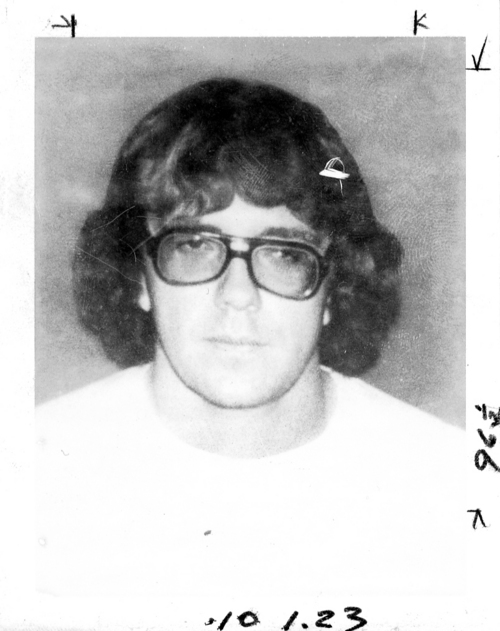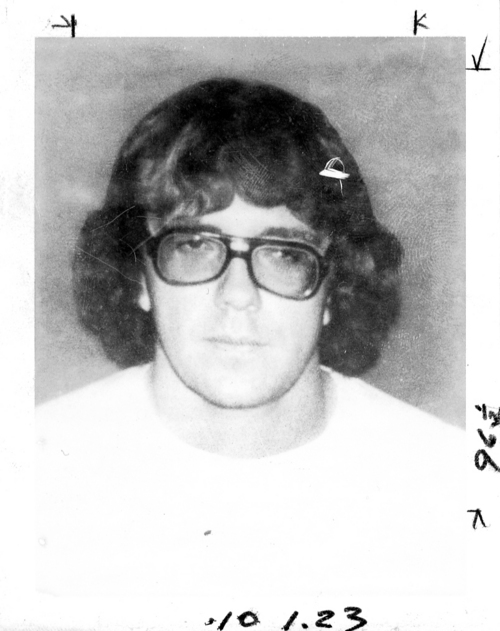This is an archived article that was published on sltrib.com in 2013, and information in the article may be outdated. It is provided only for personal research purposes and may not be reprinted.
For 33 years it has been an unresolved question: Why did Joseph Paul Franklin put Utah on his cross-country campaign to start a race war by killing Jews, blacks and whites engaged in "race mixing?"
Now he has answered that question.
Franklin, who is to be executed just after 12 a.m. Wednesday for murdering a Missouri man in 1977, solved the mystery in an hour-long, no holds-barred telephone interview. The conversation covered Franklin's childhood, his crimes and what drove him to commit two bombings, 16 bank robberies, eight known murders and suspected ambush-style attacks that left at least a dozen other people dead or injured between 1977 and 1980.
Among Franklin's victims: Ted Fields, 20, and David Martin, 18, who he shot in Salt Lake City on Aug. 20, 1980, as they left Liberty Park after jogging there with two white girls.
Now 63, Franklin had no trouble recalling details of his crimes.
Franklin said he traveled the country in the late 1970s "on my mission, and my mission was to try to target any people I felt were enemies of the white race." He roamed from Tennessee to Wisconsin, Missouri to Georgia, Oklahoma to Indiana, Ohio to Pennysvania and Virginia.
How did Utah end up on Franklin's itinerary?
Franklin said he joined The Church of Jesus Christ of Latter-day Saints in 1974, at age 24, while living in Atlanta.
A spokesman said the LDS Church does not verify individuals' membership status.
Franklin said he liked the faith's strict stance on fornication and its prohibitions on smoking, alcoholic beverages, coffee and tea — the latter stimulants that affect a person's nerves, he added.
He already had been baptized twice by other faiths — the Baptists and the Church of Christ — and, according to biographer Mel Ayton, had dabbled in numerous other religions and psychic practices including numerology. Then he tried Mormonism.
Franklin first traveled to Utah in 1975 to check out his new faith's hometown. And while Franklin found the state beautiful, he didn't like some of what he saw.
"I couldn't help but notice all the miscegenation going on there," he said.
On a mission • His enthusiasm for the LDS Church faded and within a few years Franklin said he became disillusioned with "their attitude on race." In 1978, the LDS Church allowed African-Americans to become members of its lay priesthood.
At that point, Franklin's views about Jews and African-Americans had already been hardened by his association with the Ku Klux Klan, American Nazi Party and National States Rights Party. Franklin told the Southern Poverty Law Center recently he became enamored with Nazism as a teenager after learning his mother's relatives, who lived in Germany during World War II, had been party supporters; he stole a copy of "Mein Kampf" and read it repeatedly.
His ideas solidified in what Franklin has described as a God-given calling to start a race war. He carried out his mission of killing Jews, whom he considered evil, and those who crossed racial lines with remarkable precision despite the happenstance that played into many ambushes.
Consider Franklin's first shootings in August 1977, which left Alphonse Manning Jr. and Toni Schwenn, both 23, dead.
Franklin said he traveled to Wisconsin to kill a judge who had released two African-American men suspected of raping a white woman. En route, he robbed a bank and "almost got caught."
Franklin drove on to Madison, Wis., where he picked up some teenage girls and gave them a ride to a nearby mall.
"I asked about that case and they said they'd heard about it and were kind of mad, and I got really mad talking about it," Franklin said.
As Franklin left the mall parking lot, Manning, an African-American, almost backed into him. Franklin said he laid on his horn and could tell it irritated Manning, who then drove slowly out of the lot "trying to make me mad." Manning's passenger, Schwenn, was white.
Franklin put his hand on his car horn and kept it there. Finally, Manning stopped his car, got out and walked toward Franklin.
Franklin said he figured, "Now I've done it, I'm getting in a fight with this n——-" after barely getting away with robbing a bank and with a stash of stolen guns.
As Manning approached, Franklin reached under his seat and pulled out a .357 Magnum and "bam, bam" shot him twice.
"He had a scowl on his brow the whole time," Franklin said. "As soon as he saw that 6-inch barrel, his eyes opened wide in fear. He knew he was a goner."
Franklin then figured he "might as well send that bitch to hell, too," since he was likely to be caught and get a life sentence and Schwenn had been "race mixing" with Manning.
He got out of his car and shot Schwenn once. Franklin said he went back to his car and then saw her exiting Manning's car, so he pulled alongside and "finished her off with a shot."
Several other killings were equally random. Franklin has said he was waiting on an overpass in Cincinnati to shoot an interracial couple when Darrell Lane, 14, and Dante Evans Brown, 13, walked by on their way to get sodas at a nearby market. Franklin shot the cousins, both African American, instead.
Many victims were engaged in routine activities in public places — at the grocery store, eating fast food, hitching a ride, leaving work. Franklin, who suffered a childhood bicycling accident that left him blind in one eye and with diminished sight in the other, said he perfected his skill as a marksman at a shooting range in Memphis, Tenn.
He also stalked victims — among them civil rights leader Vernon Jordan and Hustler magazine publisher Larry Flynt — picking in advance vantage points where he wouldn't be seen or could make a quick get away.
"I was real surprised I got away as clumsy as I was in some of these operations," Franklin said. "Fate helped me get away."
Back to Utah • Franklin arrived in Utah for his second visit on Aug. 10, 1980. Over the next 10 days, Franklin stayed at various motels under a pseudonym and roamed Salt Lake City, freely sharing his racist views and disdain for "race mixing." He told a prostitute he was capable of killing black people and getting away with it and offered to take out some men with whom she was angry.
Instead, he wound up at Liberty Park as night fell on Aug. 20.
Early that even, he picked up two young women near the park and gave them a ride, drilling them about their feelings toward African-Americans.
Franklin then went back to the park and said he began stalking an interracial couple he'd seen enter a 7-Eleven store on the corner that is now home to Beans & Brew Coffee House. Franklin saw an empty lot north of the store and decided he would wait there to "ambush" the couple.
"I was waiting for them," he said. "I was not sure if I missed them or what. No one came out. And all of a sudden I saw this interracial couple jogging."
It was Ted Fields and David Martin and their friends Terry Elrod and Karma Ingersol, both 15. It was approximately 10:15 p.m. and they were crossing 900 South at 500 East.
"I hadn't expected that," Franklin said. "They just happened to be in the wrong place at the wrong time."
Franklin said he swung his rifle and blasted one of the young men. He was surprised that "after I dropped the first one" the other man and the women tried to drag him across the street.
"I immediately pushed the lever-action and shot the second black," Franklin said. "As soon as he dropped, the girls evidently figured it was not a good time to be here. I heard one say, 'Run.'"
Elrod would later describe hearing what sounded like a firecracker and then noticing her arm was bleeding. Another shot rang out, though she could not tell where it came from. She recalled Martin saying, "They've got me." As she and Fields began to drag him across the street, there were more blasts and Fields told her to run. She did.
Franklin said he swung his rifle in the direction of the women but didn't have a clear shot.
"I would have wiped both of them, too," he said.
Witnesses watched in horror as the men struggled to get up and subsequent shots rang out until Fields and Martin finally lay still in the street. Some witnesses spotted a rifleman in the field, watched as he opened and placed something in the trunk of a 1975 Chevrolet Camaro and sped off.
Elrod later realized she'd seen the vehicle earlier going the wrong way through the park and the driver had even stopped and asked the two women, who were lagging behind their friends, if they needed a ride.
Franklin said he stayed in Utah another two nights and then traveled to Nevada and on to San Francisco.
On trial • Initially, police hesitated to definitively say the shootings were racially motivated. That changed in a matter of days as Franklin surfaced as a suspect.
He was arrested on Sept. 25, 1980, in Florence, Ky., after being stopped on a possible stolen car charge, but escaped from the jail five hours later. He was arrested again about a month later in Lakeland, Fla., at a blood bank after a technician recognized a tattoo of the Grim Reaper on his right arm.
By the time Franklin was brought back to stand trial here on federal charges, law enforcement had begun to pin him to sniper shootings in other states.
Franklin was tried first on federal charges of violating the civil rights of Fields and Martin and found guilty on March 5, 1981. At his sentencing several weeks later, Franklin called prosecutor Steven Snarr a liar and "little faggot" and lunged at Richard Roberts, an African-American civil rights attorney with the U.S. Department of Justice, whom he called a "trained ape."
Franklin told U.S. District Judge Bruce S. Jenkins the trial was a "farce" and the judge was "nothing but an agent for the communist federal government anyway, you bastard."
The judge ordered Franklin to serve two consecutive life sentences, the same penalty he received that fall following a state trial on first-degree murder charges. Franklin admitted in 1990 he killed the two Utah men.
Prosecutor Robert L. Stott, who is still with the Salt Lake County District Attorney's Office, had sought a death sentence but respects the jury's decision.
"It was a big case," he said. "We weren't used to shootings right there downtown, right at an intersection of the most popular and used park in the whole city. ... It was a huge shock."
And the case became that much more stunning and important, Stott said, as its racial context and ties to other crimes became clear.
"He's a guy who caused a lot of grief in many parts of the country and he certainly caused a lot of grief here in Salt Lake City," Stott said. "It was a very good thing he was charged and arrested and convicted. He would have gone on."
Franklin said much the same thing.
"Luckily, I got locked up. I'm glad I got caught," he said.
Seeking forgiveness • Franklin describes himself as "very mentally ill" at the time of his killing spree, adding that "I do regret that. I apologized."
"As a general rule I hated blacks," he said, but "not every single one."
He has not abandoned his view that "race mixing" is a sin, but said he no longer believes it is an "unpardonable thing" and now "wouldn't think of committing violence toward them."
"It's their life," he said, adding that such behavior was "none of my business."
Today, "I just don't hate the race as a whole any more," he said.
The "cause of it all," he said, was growing up in a poor, abusive home dominated by his mother, especially after his alcoholic father abandoned the family.
"I was always little and weak for my age because of malnourishment," he said. His mother beat him often, Franklin said, and was a "sadist" who one time poured boiling water over the back of a puppy he and several other children were playing with in the yard of their home in the Birdville neighborhood of Mobile, Ala.
Johnnie Mae Martin, David's mother, doesn't understand the hate that fueled Franklin.
"Anyone who has that much hate has to be sick," she said. "I don't hate any race of people. I am so glad I don't. I just don't have hate in my heart."
But she did have a question for Franklin: "How did you feel after you shot my son?"
"At the time I shot her son, I was just out of my gourd so I just considered that another special operation, mission accomplished," Franklin said. But "I regret the fact I took the young man's life now. I wish there was something I could do other than just apologize to her for this. This is an apology to her. I'd like her to forgive me and the other people there, too."
Terry Elrod, now Terry Jackson-Mitchell, said she has forgiven Franklin for what he did to her but "can't even wrap my head around what he did to my friends. I don't think I even have the right to forgive him for what he did to my friends."
She's moved on, as much as she can, from what happened that night, but is still struggling to understand forgiveness and what it should feel like, still wrestling with conflicted feelings about the fact Franklin faces death for killing a white man rather than any of his African-American victims.
"I felt he should have gotten the death penalty when he murdered my friends," she said. "When those verdicts came down it broke my heart. It still does. ... I'm glad it's not my decision. It's such an ugly question to turn over in your head, whether someone should die or not."
Franklin said Jackson-Mitchell is the only victim who reached out to him to discuss his crimes and during their conversation he was "told by the Lord that she was my daughter, my child, in a previous incarnation."
"I really regret wounding her now," he said. "I apologized to her for the crimes I committed."
He also asked for her forgiveness and "she kind of surprised me with her answer. She said, 'You're already forgiven.'"
Franklin was moved on Oct. 23 to the Eastern R & D Correctional Center in Bonne Terre, Mo., where the state's executions are carried out. He is in solitary confinement, as he has been for three decades.
A phalanx of defense attorneys as well as the ACLU of Missouri continue to seek a stay of execution, but so far have been unsuccessful. Among those who've come to Franklin's aid in support of that effort: the Salt Lake Branch of the NAACP and Flynt, who was left paralyzed from the waist down after Franklin shot him in 1978.
Franklin said he learned years ago about Flynt's "liberal" anti-death-penalty views.
"I was surprised but also glad to hear he was making that known and telling them that is wrong," Franklin said.
His routine is much the same as it's always been, Franklin said, even with his scheduled death days away. He meditates and reads the Bible or other scriptures — the Koran, Bhagavad Gita or other Hindu writings — daily.
"I'm a firm believer in having a close relationship with the Lord," he said.
File images
The many faces of serial killer Joseph Paul Franklin, pictured most recently (far right) during a 1998 murder trial in Cincinnati.


